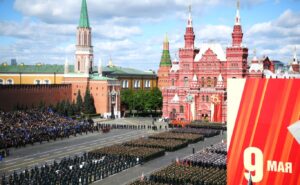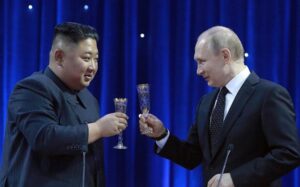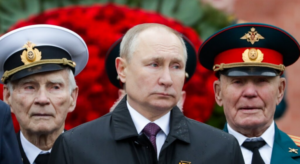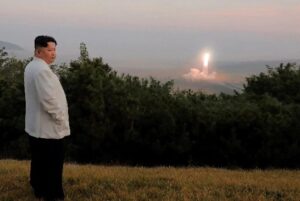Day Says About Its Relationship with Russia

On May 9, 2025, Moscow’s Red Square was awash in military splendor and patriotic fervor as it celebrated the 80th anniversary of Victory Day—commemorating the Soviet Union’s triumph over Nazi Germany. President Vladimir Putin, presiding over the ceremony, sought to project an image of a resolute Russia, unbowed by Western sanctions and backed by its international allies. Yet amid the grandeur of the parade, one absence spoke louder than all speeches and displays: North Korea, a supposed military ally of Russia, was notably missing. This diplomatic snub—far from accidental—revealed the calculated pragmatism underpinning Pyongyang-Moscow relations, exposing tensions and strategic divergences that could reshape their fragile partnership.
A Strategic Miscalculation: North Korean Troops in Russia’s War

In recent months, North Korea’s involvement in Russia’s war in Ukraine has become an open secret. Pyongyang officially confirmed the deployment of its troops, a significant step in solidifying its role as Russia’s ally. However, this decision proved a poisoned apple for both parties. For Russia, reliance on North Korean forces—a state under heavy international sanctions—further isolates Moscow diplomatically and reinforces its pariah image. The image of the world’s second strongest military power leaning on a client state like North Korea undermines Russia’s portrayal as a self-reliant strategic force, which Putin attempts to cultivate. Russian citizens are also aware: replacing Russian soldiers with North Korean troops signals fading hopes for victory in this war.
For North Korea, the decision to send troops is no less risky. By participating in Russia’s war, Pyongyang becomes complicit in war crimes, possibly leading to Kim Jong Un’s prosecution by the International Criminal Court (ICC). It is also a blatant violation of international law and UN resolutions, likely resulting in increased sanctions. Moreover, North Korea’s involvement may provoke future military intervention by the US, NATO, or European powers, hastening Russia’s defeat and dragging Pyongyang into a larger conflict.
Diplomatic Snub on Victory Day

North Korea’s absence from the Victory Day parade was not a mere oversight but a deliberate act. Thirteen countries, including China and Belarus, sent military delegations, but North Korea—the only foreign nation actively participating in the Ukraine war on Russia’s side—sent no one. Despite a personal invitation from Putin during his 2024 visit to Pyongyang, and a second invitation relayed in March 2025 by Security Council Secretary Sergei Shoigu, Kim Jong Un declined to attend without explanation. Even Cho Ryong-hae, chairman of the Standing Committee of the Supreme People’s Assembly, who was expected to represent Kim, abruptly canceled his trip at the last minute, breaching diplomatic protocol.

To top it off, a day before the parade, North Korea launched a ballistic missile into the Sea of Japan, diverting global attention from Moscow’s celebration. This provocative act was perceived as a deliberate attempt to eclipse Russia’s holiday, signaling Pyongyang’s discontent. Although North Korea frequently proclaims anti-Western solidarity with Russia and China, its actions reveal a regime driven solely by self-interest, not ideological loyalty.
The Shadow of China: The Real Power Behind Pyongyang’s Calculations

At the heart of North Korea’s restraint lies its dependence on China. Economically and diplomatically, Pyongyang heavily relies on Beijing, and overt alignment with Moscow risks upsetting its chief patron—something North Korea cannot afford. Symbolic events like Victory Day carry significant weight in this delicate power balance. Additionally, sources familiar with the matter say Pyongyang is dissatisfied with insufficient—or entirely absent—compensation from Moscow for its covert military support in Ukraine. North Korea likely expected more substantial rewards, particularly advanced military technology and economic concessions. This shortcoming likely contributed to Pyongyang’s reserved diplomatic stance and its decision to minimize public ties with Moscow during the high-profile holiday.
Pyongyang-Moscow relations, often touted as a “strategic partnership,” are not built on shared ideals but mutual convenience. North Korea provides Russia with weapons, labor, and troops, but its behavior on Victory Day underscores a transactional mindset. For Pyongyang, Russia is not a comrade, but a counterweight to Western influence—useful only as long as it serves its interests. If North Korea sees greater strategic benefits in aligning with China—or even the US—it would abandon Moscow without hesitation.
A Fragile Alliance Under Pressure

North Korea’s absence on Victory Day laid bare the limits of the Russia-Pyongyang alliance. Though both nations display unity against the West, their partnership is riddled with distrust and diverging priorities. For Russia, support from North Korea is a desperate measure in a war draining its resources. For North Korea, Russia is a temporary ally, valuable only until a better opportunity arises. Kim Jong Un’s absence from Russia’s most sacred national holiday signals pragmatic rather than loyal ties.
As the war in Ukraine drags on, cracks in this alliance may deepen. North Korea’s missile launch and diplomatic snub suggest a regime hedging its bets, unwilling to tightly bind its fate to a weakened Russia. Meanwhile, Putin’s reliance on North Korean troops risks further isolating Russia on the global stage, reinforcing the perception of a declining power. Victory Day, intended to showcase Russia’s strength and unity, instead revealed a harsh truth: even its closest partners are keeping their distance.
Conclusion
North Korea’s absence from Russia’s Victory Day parade was not just a diplomatic slip—it was a calculated message. Pyongyang’s silence spoke volumes about its strategic priorities, discontent with Moscow, and dependence on China. As Russia leans on North Korean support in the Ukraine war, it risks becoming the junior partner in a relationship built on mutual benefit. For Kim Jong Un, an alliance with Russia is a means to an end—not a shared cause. The world is watching, and North Korea’s next move could reshape the geopolitical landscape in ways neither Moscow nor Pyongyang fully anticipate.








